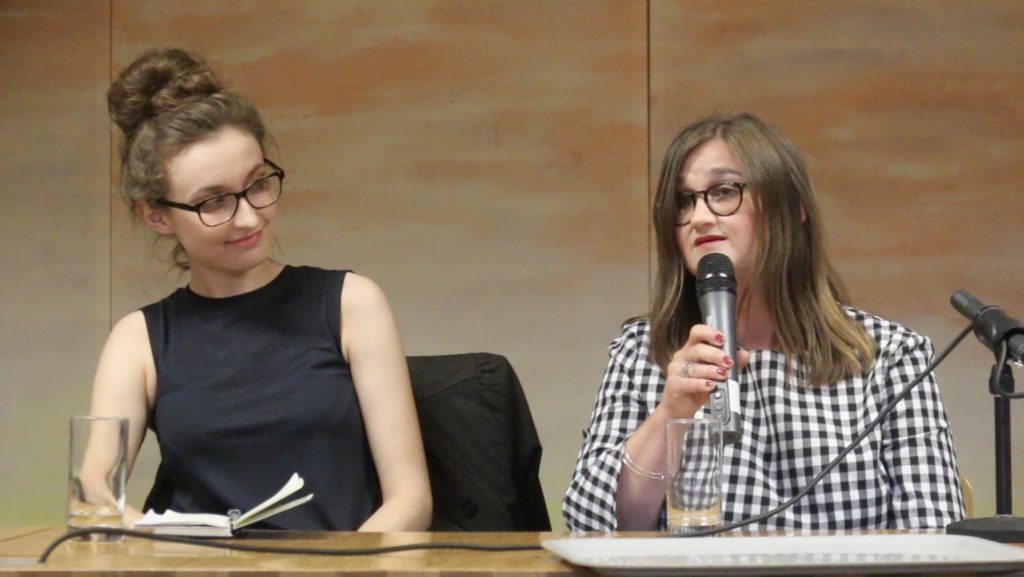#skillsseptember – A Ddylai Robotiad Siarad Cymraeg? (Should robots speak Welsh?)
18/9/18
During the Summer, we hosted our first event at the National Eisteddfod in Cardiff Bay. The subject of debate was, 'Should robots speak Welsh?' Here are the reflections of Meilys and Indeg who sat on the panel.
Meilys Heulfryn Smith, Senior Transformation Manager – Gwynedd Council
@MeilysHeulfryn
When invited to participate in a panel discussion titled ‘Should Robots Speak Welsh?’ at the National Eisteddfod in August, my initial thought was “what on earth do I know about robots?” However, give me the chance to discuss the future of my language, and I’m in!
Gradually, the reality of my daily life dawned on me. Of course I know about robots! I speak to them every day, they help me will all sort of tasks and look after my wellbeing. Not many are human- shaped, but they definitely speak to me!
I no longer carry an atlas, watch the weather forecast or buy CDs. I have apps, bits of equipment, an array of chargers and the ability to demand or receive commands without a person in sight. That is my life. I’m a first language Welsh speaker, but gradually, more and more of my ‘conversations’ aren’t through the medium of Welsh.
Recently, I’ve been involved in developing a Virtual Reality experience to help people understand more about dementia. It’s a highly emotive subject, and this particular robot had to speak both Welsh and English, so that people in Wales can see, as realistically as possible, how it feels to live with dementia.
This VR project helped me see that technology can speak any language, if you give it the chance and if you give it the words and the voice to express itself. However, this development wouldn’t have happened had we not commissioned a bilingual development, together with a bilingual script-writer.
Technology is part of ordinary daily life. Building Welsh robots will help achieve the target of a million Welsh speakers by 2050. Innovation can happen, and does happen in Wales and in Welsh. The Future Generations Commissioner’s panel discussion gave me confidence that we’ll be walking alongside many more Welsh-speaking robots in the future.
Indeg Williams on robots
@IndegElen
If you think about ‘robots’ like Apple Siri, Amazon Alexa, Microsoft Cortana etc, most people recognise these as ‘robots’ that speak English. Although you can control or question your mobile phone, computer or car in English, there is a long list of languages with fewer resources, like Welsh which are not supported by these big companies. So, at the moment, ‘robots’ don’t speak Welsh. But I think that they definitely should.
At the moment, if a Welsh-speaking family wants to use Alexa for example, the language of the household must switch to English. Welsh speakers should have the choice to use Welsh if they want to.
Although it’s fun to be able to communicate with your devices, don’t forgot that other sectors can benefit from this technology. The media can use it to archive and catalogue their work. Schoolchildren can use the technology in the classroom or older learners can use it to practise. Even more important is its use in health sector. Through projects, like Lleisiwr, the technology can be used to store the voices of patients who would otherwise have lost their Welsh for ever.
At the Language Technologies Unit, Canolfan Bedwyr, Bangor University I am collecting Welsh voices to train Macsen, our intelligent personal assistant, to speak Welsh. The more examples Macsen has, the better this ‘robot’ will work. Through contributing your Welsh voices and apps like Paldaruo or Mozilla Common Voice, you are supporting this campaign to ensure a digital future for the Welsh language.
Our way of communicating has changed dramatically and will continue to do so. It is becoming increasingly clear that technology like this is vitally important to ensure the future of our language for the next generations.
